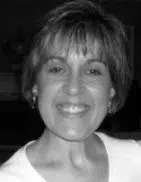PUBLISHED: 15th July 2005

By Lauren Dubin
For women with BRCA mutations, creating appropriate and comforting dialogue with our children can be a difficult challenge. How we as mothers cope with the fear and uncertainty of our high-risk status trickles down to them.
Cancer has shrouded my own life since childhood. My mother never discussed her breast cancer with me. She never talked about her radical mastectomy or her feelings. Only when I was 44 and facing my own breast cancer—33 years later—did she share the details with me. As a child, I recall hushed conversations and seeing her wave to me from her hospital window as I stood outside feeling left out and afraid. Later, I remember sitting silently in the kitchen together, while she did her creepy crawly exercises up the wall. I was no longer invited to sit on her bed to watch her dress. The bed was replaced with a closed door. I would sneak peeks at her satin prosthesis; it scared me to pieces. It was the language of her cancer. It spoke the words that she couldn’t or wouldn’t say.
As a teenager, I desperately needed reassurance my mother would be all right. I hated her silence. I wanted to talk about her cancer; to ask my many questions. I wondered about my own risk, even then. I vowed to never keep my children in the dark about our family’s cancer legacy. Now, it’s my turn. I must find the right words to tell my children about others in our family who have developed cancers: my aunt, my cousin, my sister, and me.
I appreciate now what my mother attempted through her silence: to protect me. What she didn’t know was that her silence made the situation much worse. The unspoken fear of recurrence haunted me for years. So I am doing it differently. Not perfectly, perhaps, because being open isn’t as easy as it sounds and sharing is a work in progress.
Cancer, with its increased doctor appointments and hushed phone calls, can fill children with fear. But which details should I share with my daughter and which should I hide? Too much and she might obsess over her own cancer risk. Too little and she might feel left out. I know my daughter understands that my BRCA status inexorably links her to a legacy of women fighting and coping with cancer. She’s heard me discuss our family’s risk and listened as I struggled with medical decisions. When she was only 11, she cared for me as I recovered from a prophylactic oophorectomy. And at 15, she heard the words I heard so many years before: her own mother has breast cancer.
The difference is that she knows I will not ignore her fears. I frequently invite her to share her feelings. I let her know that nothing is taboo or off-limits. Slowly, as I move beyond my own treatment, we’re moving from feelings to facts. I’m just beginning to find the words to help her move toward awareness of her own risk and choices. It’s too early to decide on testing. It’s never too early to talk. We may share a hereditary cancer legacy, but I’m doing everything I can to break the legacy of silence.
Confronting a Legacy of Silence
by Dr. Paula Rauch
Lauren’s childhood experience matches what we often hear through Parenting At a Challenging Time (PACT), the Massachusetts General Hospital Cancer Center Parenting Program. When parents exclude children from dialogue to protect them, children often feel alone with their worries. The imposed silence—an “error of kindness”—indicates a topic is too scary to discuss or that the child is not important enough to be included in the conversation.
Starting the conversation
What does a child really understand about cancer? How much is too much to tell? At what age is it appropriate to talk about risk? Using the word “cancer” is the prerequisite for inviting an open discussion. By teaching a child what cancer is, parents begin a positive education process. Euphemisms such as “bump”, “lump” or “boo-boo” are confusing; children are likely to have bumps and lumps themselves and may imagine they have a serious problem.
Preschoolers (ages 3-6) mix fantasy and reality in their understanding of the world, imagining things from their own egocentric positions. They are too young to understand risk. If you have breast cancer, discuss this with your child. Allay his fears that he did something to cause your cancer or change your mood.
Elementary school children (ages 7-12) expect the world to follow clear rules. They need simple explanations—cancer is made up of cells that grow too fast and must be slowed down. Discuss what you are doing to treat the cancer or watch for its appearance; at this age, kids understand preventative actions, like wearing seat belts or bike helmets to be safe.
Adolescents think complicated thoughts like adults, but their problem solving and behavior is influenced by emotion. Encourage them to share their worries and feelings. It is also normal for teens to become close to adults other than their parents. If you can, make sure these adults understand your medical situation and provide your child with accurate, caring support.
If your children ask whether you might die from cancer, answer honestly; but let them know you have good doctors and you are taking actions to live a long time. Assure them you are not worried about dying from breast cancer now and that if it becomes a concern, you will be honest about it.
Responding to your children’s questions with open honest dialogue is the best way to help them feel safe and loved in this uncertain world.